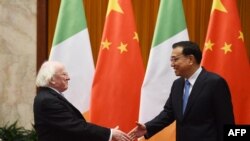Ireland, like many other Western democracies, wants to maintain a healthy trading relationship with China, yet is growing increasingly disturbed by Beijing's human rights record and increasingly aggressive stance on the international stage, say officials and experts.
Senator Malcolm Byrne of Ireland’s conservative Fianna Fáil party told VOA that his country wants to continue to trade with China, yet Beijing’s oppressive approach to minorities — especially the Uighurs in the Xinjiang region — is unacceptable under international norms.
“Beijing in its approach to the Uighur people to Tibet to Hong Kong, as well as the unlawful detention of a number of individuals, is wrong,” Byrne said. “We cannot turn a blind eye to the growing abuse of human rights and the rule of law by the CCP [Chinese Communist Party].”
He also supports moving the 2022 Winter Olympics from Beijing to another location. “The CCP should not be granted the propaganda opportunities,” Byrne said.
Tense relations
Several recent incidents have intensified many Irish people’s doubts about Beijing.
One of the biggest concerns is China’s jailing of Richard O'Halloran, an executive with the Irish subsidiary of an aviation leasing company. He traveled to China in February 2019 to help settle a commercial dispute that resulted in the arrest of his employer on charges of defrauding Chinese investors of $70 million.
While not charged with any crime, O'Halloran has been told he cannot leave China until the money is returned to the investors. This situation has persisted for two years.
Another high-profile case involves China’s telecommunication giant Huawei. The chief executive of Huawei Ireland, Yang Xu, recently wrote to Ireland’s minister of defense, Simon Coveney, criticizing an academic who raised security concerns about the telecom company accessing Ireland’s 5G network.
Last December, Richard Maher, a lecturer in politics at University College Dublin, published an essay in Defense Forces Review titled “5G and the Huawei Question in Ireland.” He wrote that Huawei had "murky ties" to the Chinese government, and as a result, giving the Chinese company access to Ireland’s 5G mobile network posed “serious and arguably unmanageable security risks.”
Xu said the essay constituted an “extraordinary and completely false attack” on the company,” and requested the government’s “full support in mitigating the damage that has been done.”
Maher said that Huawei's decision to go to the highest levels of the Irish government to criticize his essay was highly unusual.
“Their reaction to the essay exemplifies the risks of including the company's equipment in Ireland's 5G mobile networks,” Maher told VOA.
Niall Duggan, a lecturer in the Department of Government and Politics at the University College Cork (UCC), told VOA these recent incidents marked “the end of a naïve assumption that Irish companies and individuals somehow would not be affected by foundational issues in China of political and legal freedoms.”
Reducing China dependence
Ireland faces the same dilemma as many other Western democracies. On the one hand, it relies on China's huge consumer market to bolster its economy; but on the other hand, it is increasingly disturbed by Beijing's aggressive behavior in the international arena.
In fact, Ireland is one of the few countries that enjoys a trade surplus with China. Last year, its trade surplus over China reached about 4.35 billion euros ($5.2 billion). Data from the Irish Central Statistics Office showed that in 2020, Ireland's imports and exports with China both registered a double-digit growth rate.
Four members of Ireland’s Oireachtas, the national legislature, joined the Inter-Parliamentary Alliance on China (IPAC) last month, as part of a coordinated effort to secure a tougher stance on China from the Irish government.
Duggan, from UCC, said that given the relatively small size of Ireland, its foreign policy is less confrontational than those of most Western states. It tends to rely on interpersonal relations rather than megaphone diplomacy to achieve foreign policy goals.
"The most likely response by the Irish leadership is that it will increase its policy of trying to avoid overdependence on China in any one sector,” he told VOA, “So, you may see the government encouraging more companies entering sectors such as the 5G network to reduce the influence of companies such as Huawei.”
Ireland has in fact become more vocal on the international stage about China’s human rights record. Ireland is among 39 countries that issued a joint statement last October at the United Nations, condemning China for its human rights abuses against ethnic Uighur Muslims and its crackdown on Hong Kong's autonomy.
Earlier this month, UCC announced that it would abandon a plan to establish a joint college with Minzu University of China, which specializes in ethnic studies. The school did not elaborate on the reason behind the cancellation, yet 50 scholars from UCC have previously requested an investigation into whether Minzu University was linked to human rights abuses against the Uighur people in Xinjiang.
Neale Richmond, a member of the Irish parliament, told VOA that he’s considering joining IPAC. He said China’s human rights record would inevitably hinder Ireland and the European Union from deepening their economic ties with Beijing.
“The Irish government and partners within the EU must continue to be very vocal with regard to clear concerns. The ongoing humanitarian concerns will have a major impact on the ability of the EU to conclude any deepening of trade relations with China,” he said.
Byrne agreed with that statement.
“Our government is raising our concerns with the Chinese Communist Party. But if Beijing continues with certain actions, then I believe in collaboration with our fellow EU members and also with other countries that share our concerns, we need to take tougher actions,” he told VOA.
Editor's note: A previous version of this story contained material that VOA has determined was plagiarized.









